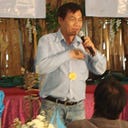The Rival Poet of William Shakespeare
and his adventures in the bamboo grooves of Japanese poetry
(Excerpts from the forthcoming book “Bards from the Far East”.)
Jose Rizal M. Reyes is the lone sonnet grandmaster of the world. He is described in William Shakespeare’s first sonnet as “the world’s fresh ornament, and only herald to the gaudy spring”. “Gaudy spring” refers to the the great global golden age of Aquarius.
Like Mark Twain of America and many other imminent individuals and organizations down the centuries, he believes that Sir Francis Bacon (1561–1626) — Lord Chancellor of England, chief translator of the King James Version of the Bible, oft-quoted essayist, and a man of many talents and achievements — was the true author of Shakespearian plays and poems.
He avers that the 154 Shakespearian sonnets were primarily addressed to him by Bacon whom he regards as his noble and beloved guru. His case is akin to that of Confucius whose spiritual master, the Duke of Chou, lived some 500 years ahead of the great Chinese philosopher. In both cases, despite the distance of time, the work of the pupil was heavily and intimately influenced by the Teacher with their respective works wonderfully complementing each other.
Shakespearian lore, and Baconian tradition to some extent, refer to this bard from the Far East as Fair Youth (meaning, he is a young soul of remarkable characteristic) and Rival Poet (meaning, his poetic talent can rival that of the Shakespearian author).
Shakesperian scholars have been puzzled for centuries regarding the identity of Mr. W. H. who is said to be the true author of the Shakespearian sonnets. This haiku composer is now revealing that “Mr. W. H.” means “Mister Who Hides” — as in, Don Quixote de la Mancha, Mister Who Hides from the (English) Channel. Why the Shakesperian author was hiding his identity can be discussed some other time somewhere else. Meanwhile, let us direct our attention to what was written, or prophesied, in Shakespeare’s sonnet number 7.
Lo! in the orient when the gracious light
Lifts up his burning head, each under eye
Doth homage to his new-appearing sight,
Serving with looks his sacred majesty.
This prophesied and awaited pupil of Bacon has written more than two thousand sonnets plus more than two thousand haiku and other poems. Many of his poems and articles have been published, mostly in provincial newspapers and also in cyberspace. He has been mentioned in blog sites once in a long while and in books once in a blue moon. This is his second expedition to the bamboo grooves of Japanese poetry and his first foray as a book author.
